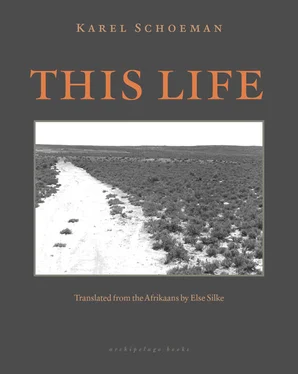Thus Miss Le Roux spent two years with us in all, and the next time we went down to the Karoo for the winter, she and Father left in the cart once more, after which we did not see her again. I must have been fourteen or fifteen by that time, for soon afterwards I was confirmed and considered fully educated: I could read fluently in Dutch and English, even the old-fashioned black letters in our family Bible, and give the meaning of most words I encountered, I could write evenly in round, open letters on unlined paper, with few spelling errors, and I could do arithmetic on paper as well as mentally, and calculate amounts in pounds, shillings and pence. I was the youngest in the confirmation class in Worcester and I knew more than any of the other young people, boys or girls, so that the old Dominee praised me in front of all the others and held up Father and Mother as an example to all parents in the Roggeveld. The other young people avoided me more than ever, however, as if I were a strange apparition, and it was almost as if they felt an animosity towards me that I could not understand. But what did I care about their antagonism? I had been confirmed and we returned to the farm and I would have nothing more to do with them.
When she left, Miss Le Roux left behind the books from which she had taught me, for Father had probably paid for them, and she counselled me not to forget what I had learned. The books remained in my room and I read in them regularly, without Mother ever commenting, though I know she was not fond of books or book-learning and never liked to see anyone read in our home. I helped her in the house and looked after Maans, and when he was about five or six, Mother said it was time for me to teach him what I knew, so that was added to my duties. I taught him to read and write and do arithmetic, everything I knew, and from time to time Father got in touch with a Dominee in Worcester and had a few more books or a case of pens and writing paper delivered. He was an easy-going child who tried his best and gave me no trouble, even though he did not learn very well, and I did not mind sharing my own knowledge with him. Personally I had never seen much use in my education, for it was more than was needed to be confirmed, and otherwise it only served to set me apart from the other young people at Nagmaal and church meetings, the boys staring at me awkwardly and the giggling girls with their arms around each other turning away from me.
Why do I relive all these things? Why do I remember how, in the late afternoon, towards evening, Maans and I would sit on a bench in front of the house, he spelling out the letters in his reading-book while I was busy with some task? The child bent over his work and the peace of the late afternoon, the wall of the house still warm behind my back with the precious heat of the day, the time when the cows came home to be milked and the shadows stretched across the yard — why do I remember this? The child asks me something so that I bend down to help him: I look up, and across his bowed head I see the veld stretched out in the evening light and the horizon changing colour, and I realise with sudden clarity that this is why they gave me an education, why Miss Le Roux was fetched from the Boland and paid in gold coins, why Father ordered the books and the cases of writing paper from the Cape: not for me, their daughter, but for the grandson and heir, so that when he was old enough I would be properly equipped to take on the task of his education.
What else did I expect then, and what reason did I have to be surprised at this insight? In some way I must have believed that it was for my own sake, their only daughter, their only remaining child, as a sign of affection that seldom found any other way of expression; but it was a foolish and reckless belief, for surely I had no right to expect more than the food, clothing and shelter that were granted to me? I still remember the desolate feeling that came over me as I sat beside the child on the bench in front of the house, staring at the veld stretching away to the horizon in the evening sun, wide and unbroken: the bench and the child beside me, the bowl on my lap — what was I doing? — and the emptiness before me in the evening light. Then I realised again how alone I really was.
For the next few years Father did his best to struggle along on the farm while his health declined rapidly, but during this time, with Maans beginning to grow up, Coenraad came to us. We did not receive many visitors, as I have mentioned, but sometimes a stranger would turn from the road or get lost and arrive at our door, usually on horseback, but sometimes on foot, like Coenraad. It was not customary for white people to travel on foot, and such visitors were not invited into the house, but were mostly given something to eat at the kitchen door and allowed to bed down in the outbuildings. When Coenraad arrived on the farm, however, we were without labourers yet again, so he did a few chores for Father and in the end he stayed on. I do not know much about him, only that he was a foreigner, and where he had been heading with his bundle of belongings I do not know either, I suppose for Beaufort or Colesberg, but he remained with us for as long as Maans was a boy. He worked diligently and conscientiously and never shirked his duties, not even when he had been drinking, and the only trouble Father ever had with him came from the farm-hands, for they complained that he was a hard master and that he beat them. Father did not approve, and in the old days he used to reprimand Jakob when he treated our people too harshly, but by this time Father’s word no longer carried much weight on the farm, and it was Mother and Coenraad who conferred and made decisions, for she trusted him and always took his side when there were differences of opinion. He slept behind a screen he had erected in the shed and joined us only at mealtimes, and I remember how strange I found it that he did not attend our family prayers, but as far as I know nothing was ever said about it.
Coenraad seldom entered the house except at mealtimes, but I remember him in the evenings at the table in the candlelight, conferring with Mother. Father sat with them, half-absently stroking his beard with one hand, not contributing to the conversation. Something gleams in the candlelight, there is a sound — is it Coenraad receiving his wages? Suddenly I remember the glint of metal, and Mother’s face in the candlelight, her sharp eyes fixed on the money as she counts out the coins. Was it his wage that he received, or could he have been given money to buy sheep at auction because Father himself could no longer go? Sometimes he was indeed sent out alone, and he even had his own mount, and it must have been Mother and he who conferred and decided on the purchases, as he increasingly became the one to bargain with the people who came to buy sheep from us. Father counted out the gold coins from the pouch Mother had fetched in the bedroom and Coenraad rode off to carry out their instructions; but more and more often it was Mother who made the decisions and gave the instructions, more and more openly it was she, and we were prospering. Father was a good person, an honest and just person, but he had never actually been a farmer. It is good when a woman is the boss on a farm.
Who said that? Surely no one in our parts would have said anything like that, except in jest or scorn? Good or not good? It is not good …?
I was spending most of my life indoors, at Mother’s side or in her shadow; my duties, my timidity and our strange, isolated way of living bound me to the house increasingly, as if life were something I watched as it occurred outside in the brightness of day, in the yard beyond the threshhold, outlined by the doorframe. I was standing in the dim light of the house — who was in the doorway, visible against the light, and whose voice could I hear outside? Were we so frequently cursed, did so many people come to protest, threatening us with reprisal, or calling down heaven’s vengeance upon us? Yes, they probably did, and most likely more often than I ever realised, for how else were those gold coins collected, the morgens of land accumulated and the sheep flocks increased? It is not good; it is not right … Who was it? The daylight outside, and a voice. Father or Mother was standing on the threshhold, or both; both were standing there, and a herdsman had come to complain. It was not right.
Читать дальше












